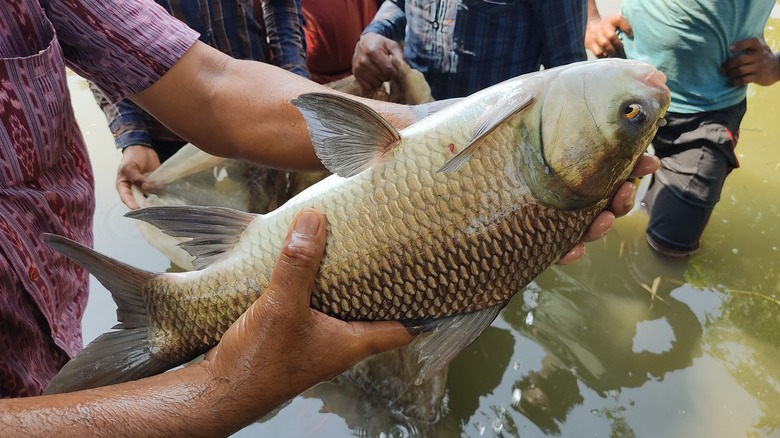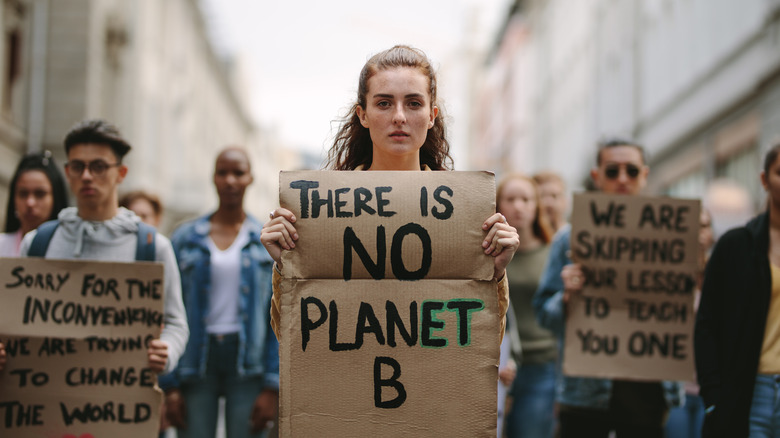New UN Report Reveals Why It's Crucial To Save The Global Wild Food Supply
Climate change, who? At least, that's the attitude many Americans have seemed to take as temperatures rise. California droughts? They'll pass. A little heat wave now and then is normal. Even sustainability-conscious consumers throw plastic peanut butter jars into the garbage because they're a pain to wash before recycling ... right? According to a Pew Research Center poll this year, while most Americans consider climate change to be a real issue, 53% doubt that their efforts will make any difference in saving the planet from the worst effects of climate change. But, a new report by the U.N. said global consumers have to do better, and they have to start now.
In the report, the U.N. adopted the definition of "sustainable use" conceptualized by the Convention on Biological Diversity in 1992: "the use of components of biological diversity in a way and at a rate that does not lead to the long-term decline of biological diversity, thereby maintaining its potential to meet the needs and aspirations of present and future generations." The key concept here is future longevity. Perhaps fittingly, then, younger generations are more likely to care about sustainable consumption according to the 2022 Food & Health Survey by The International Food Information Council (IFIC). But, the issue is larger than generations, socioeconomic demographics, and geographic boundaries — and the U.N. explained why.
Wild species sustain the entire world population
According to the U.N.'s science advisory panel for biodiversity (IPBES), 50,000 wild species including plants, trees, and animals provide staple needs like food, energy, medicine, income, and building materials for at least half the world's population. Yet, it explained, overhunting has threatened 1,341 species of wild mammals with extinction. Other threats to the long-term survival of wild species at large include logging, climate change, overfishing, and increased demand.
There's also a financial incentive for mass species conservation. The report warned that the exploitation of nature and its resources is currently and will continue to be particularly harmful to subsistence communities and developing countries who directly rely on wild species for food, and base much of their economies on nature-based tourism. The World Bank reports that, in 2016, nature tourism accounted for 10.2% of Botswana's total GDP: $7.6 trillion. Nature tourism similarly made up 10% of Tanzania's GDP and 19% of all employment in Namibia. In addition to providing biological necessities, the report warned that wild species also fulfill existential needs as well. Nature is integral to the cultural identities and religious practices of many peoples and communities worldwide.
It isn't just rural communities affected, either. Report co-chair Jean-Marc Fromentin said, "City dwellers in rich countries might not notice it, but wild plants are used in medicines or cosmetics, you eat wild fish and there is a good chance that your furniture comes from wild trees," per France 24.
It isn't too late ... yet
Luckily, there are actionable steps humans can make to help remedy this grim state of the world. The U.N. report outlined the game plan moving forward — and the first step is for bigger industrialized countries to pass the mic. "Scientific evidence is often limited, and indigenous and local knowledge is often underutilized and undervalued," the report said. Have you ever had a job where you've been told how to run your daily tasks by an administrative manager who works in an office somewhere else? It's difficult — perhaps impossible — to have an accurate, dimensional understanding of the reality of any situation unless you are physically present and have a personal lived experience to contribute to the conversation.
Battling the damaging role of climate change on resource depletion is a much larger hurdle, however — one that the U.N. said will require "transformative changes." Humans will have to substantially decrease consumption demands or come up with alternative sources to fulfill needs.
Patrick Vallance, chief scientific advisor for the U.K.'s government, warns that getting it right this time and actually making the necessary changes will be crucial for the longevity of our planet. "The last decade's targets were not met; the next decade's must be. Credible delivery plans will be required, and we need a robust mechanism for monitoring progress and holding ourselves to account," Vallance wrote in The Guardian. "This is our chance to secure long-lasting agreements to protect our planet."


